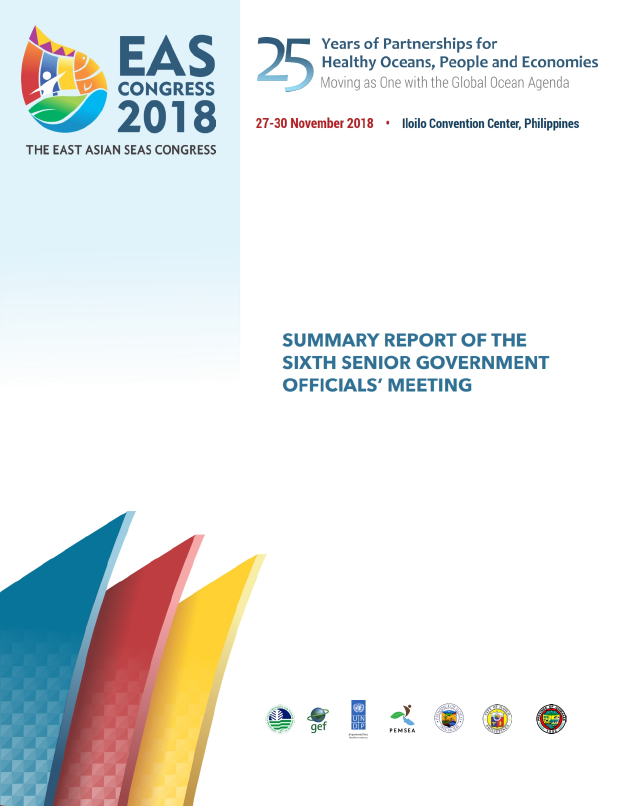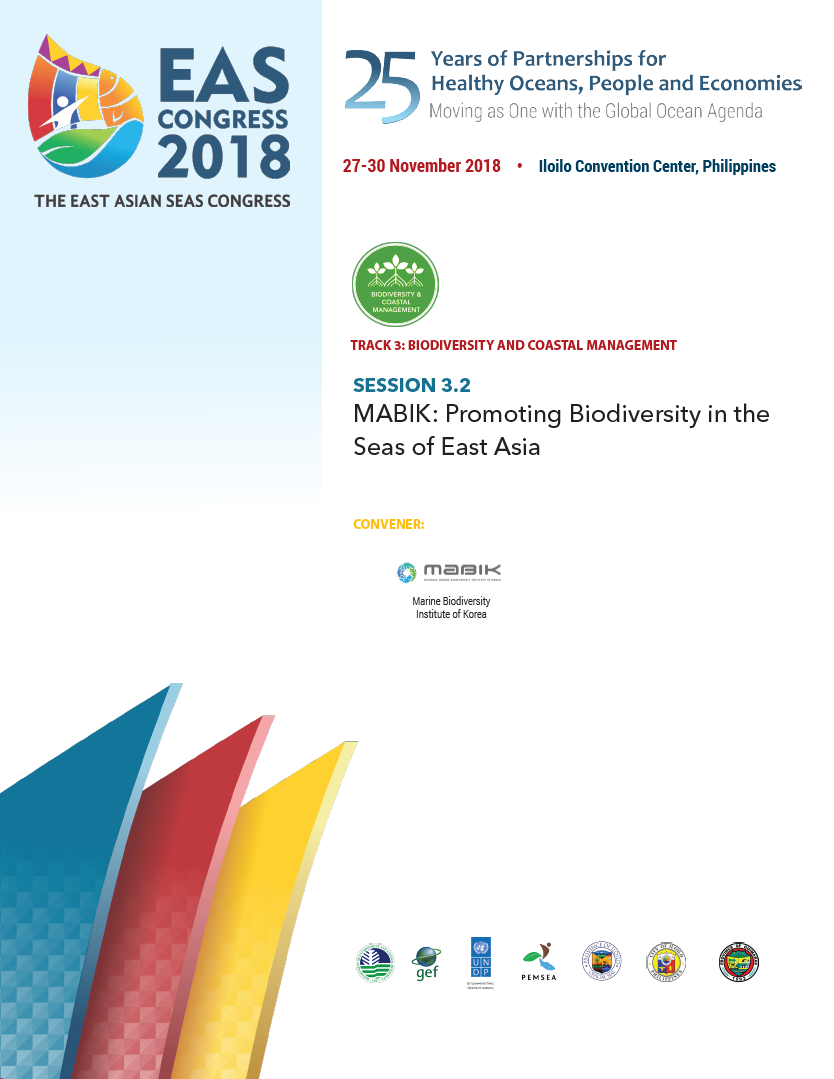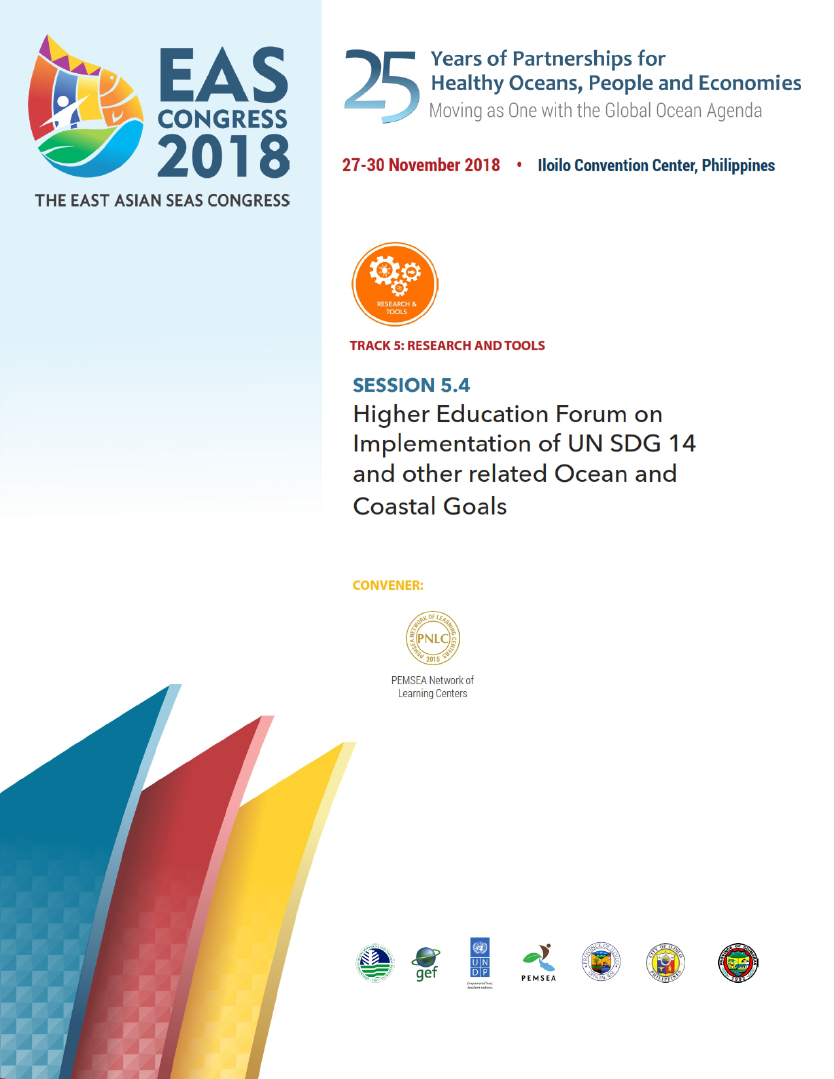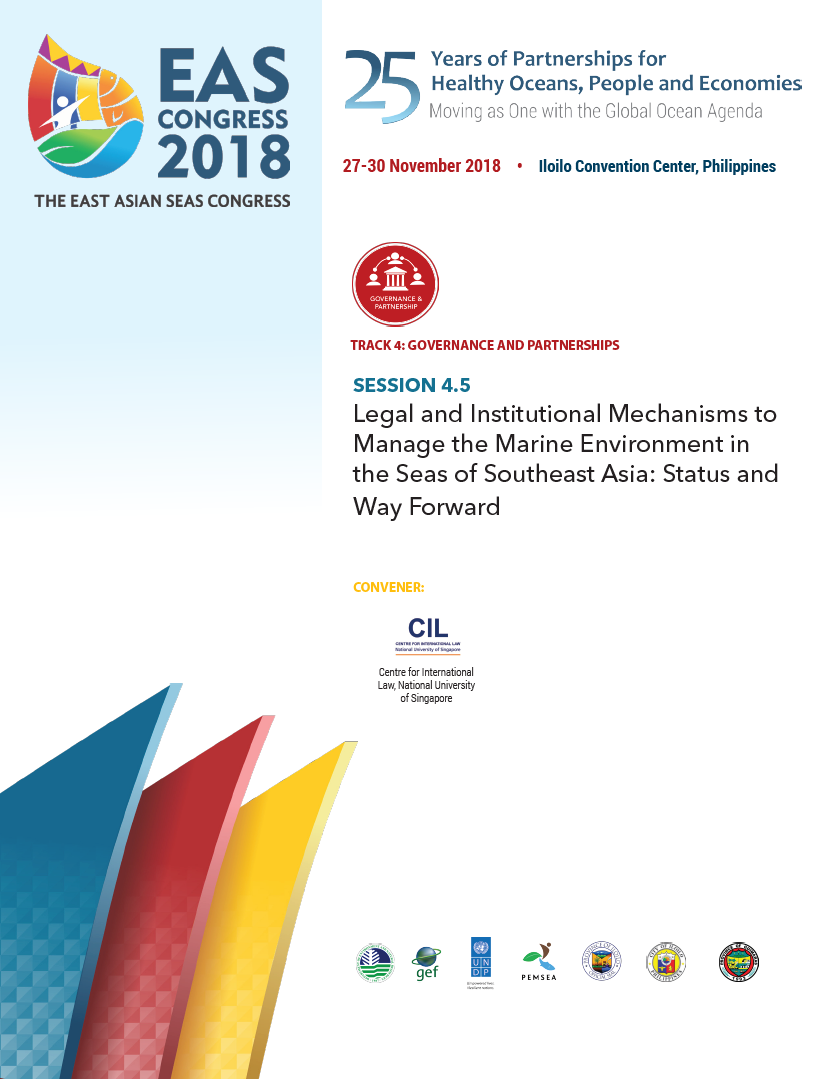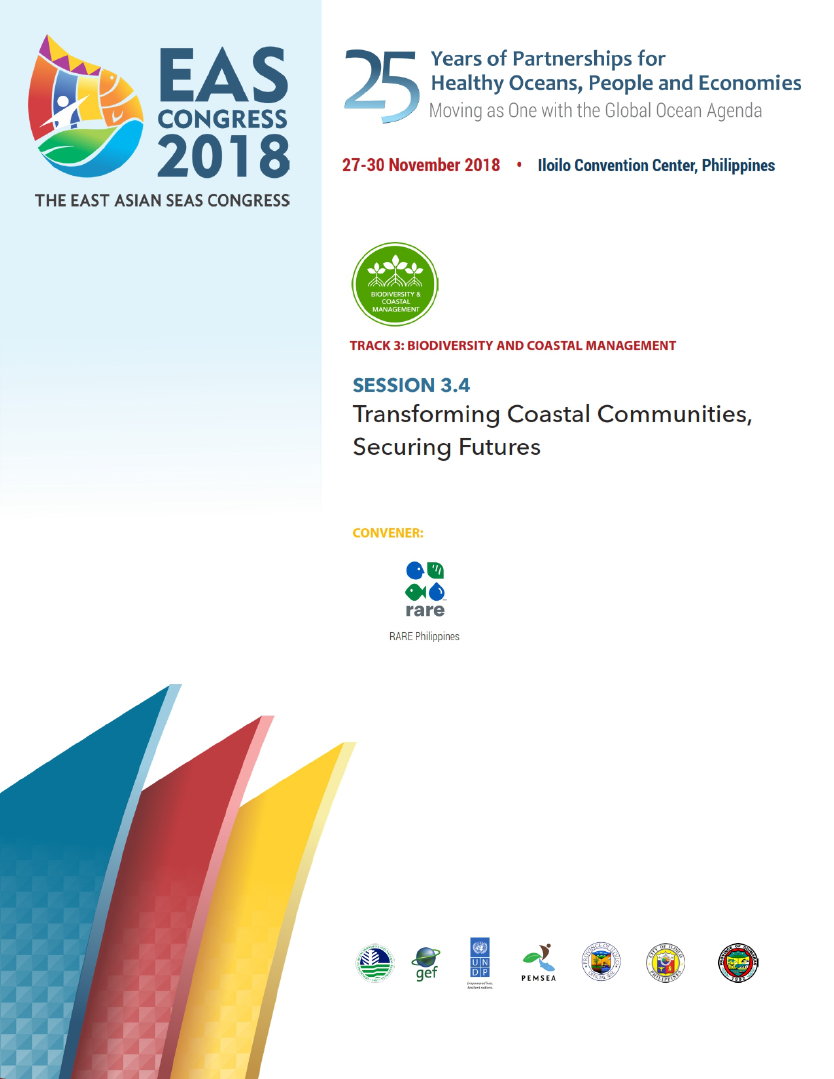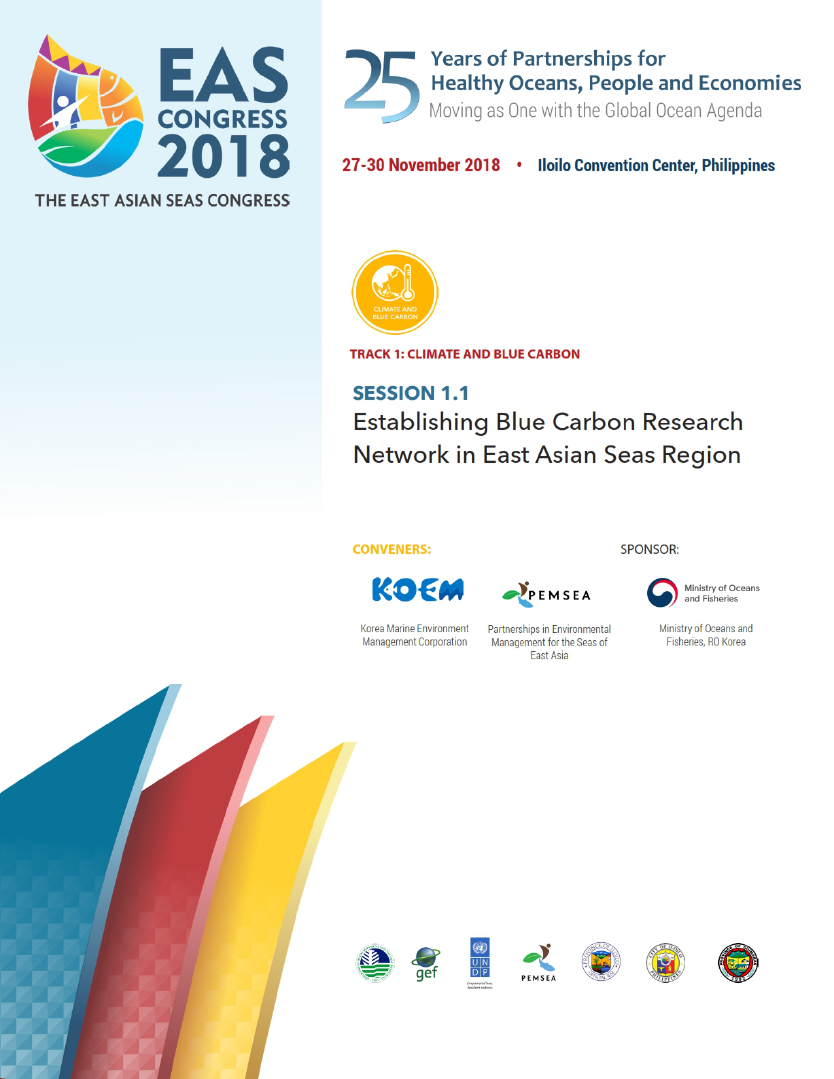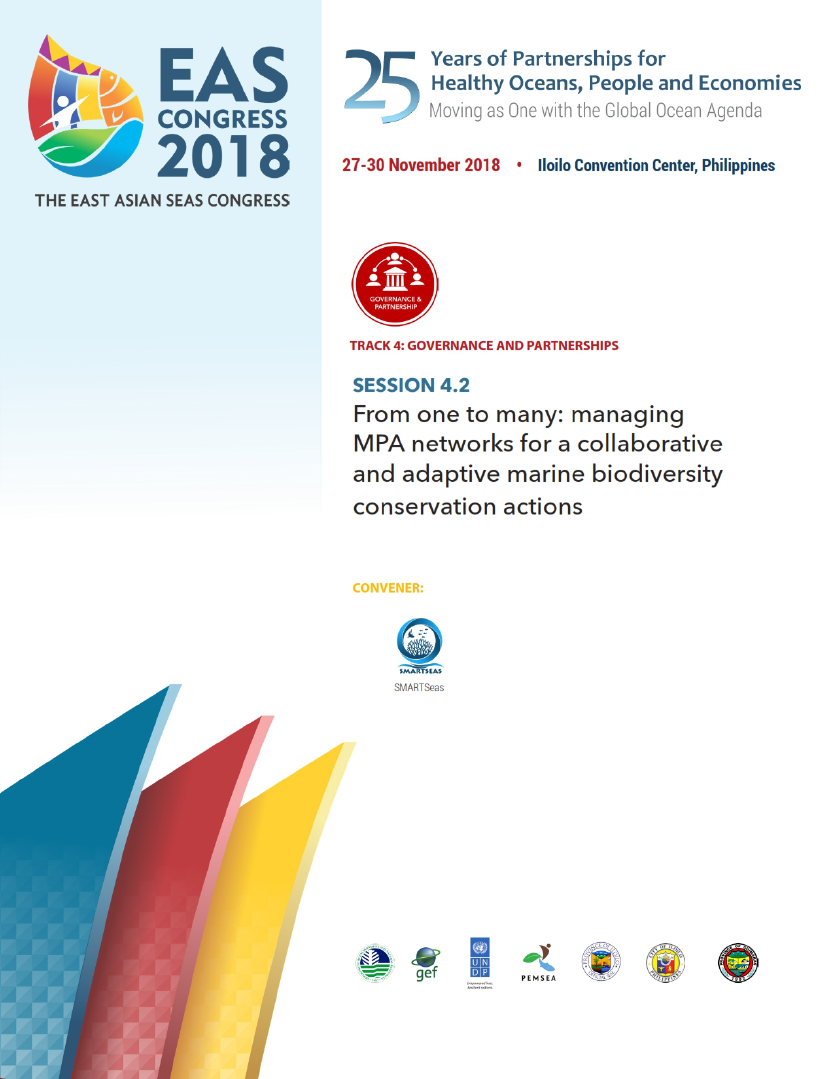
Breadcrumb
Summary Report of the Sixth Senior Government Officials' Meeting (EASC2018)
The Sixth Senior Government Officials’ Meeting (SGOM) was held at the VIP Room, Iloilo Convention Center, Iloilo City, Philippines on 28 November 2018. Senior Government Officials from 11 PEMSEA Country Partners participated in the meeting, namely: Cambodia, PR China, DPR Korea, Indonesia, Japan, Lao PDR, Philippines, RO Korea, Singapore, Timor-Leste and Viet Nam. The PEMSEA Resource Facility (PRF) served as the Secretariat for the Meeting. The Meeting agreed to adopt the Iloilo Ministerial Declaration as revised by the Meeting, for submission to the Sixth Ministerial Forum for final signature.
Proceedings of the workshop on MABIK: Promoting Biodiversity in the Seas of East Asia (EASC2018 Session 3 Workshop 2)
Aligning with UN SDGs and the Sustainable Development Strategy for the Seas of East Asia (SDS-SEA), MABIK would like to introduce itself to EAS partners by describing facilities, research projects and outreach programs. Since 2015, MABIK has conducted researches on marine biodiversity including sea turtles, sea snakes, and Sesarmops intermedius. MABIK has run and expanded outreach programs as well as research projects for better ocean literacy. MABIK wishes to meet new partners and to establish effective networks for conservation and sustainable use of marine biodiversity.
Through the Partnership Hub session, MABIK hopes to initiate collaborative research projects, outreach programs and joint workshops. It would be a good opportunity to establish joint research laboratories in mutual institutions based on collaborative agreement.
EAS Congress 2018 Daily Bulletin Day 3
EAS Congress 2018 Daily Bulletin for the 29th day of November.
Proceedings of the workshop on Higher education forum on implementation of UN SDG 14 and other related ocean and coastal goals (EASC2018 Session 5 Workshop 4)
Higher education institutions play a vital role towards the sustainable development of the coasts and seas through its core activities in education, research, governance and external leadership. Building on-the-ground capacity in implementing and scaling up integrated coastal management (ICM) programmes involve training and maintaining a critical mass of ICM leaders and practitioners in the East Asian region who can contribute to effective and efficient implementation of SDG 14 and other related ocean and coastal goals. In line with this, PEMSEA’s capacity development strategies include mobilizing universities and research institutes in increasing technical support available on the ground, providing scientific inputs from experts’ advice in focus issues in various phases of ICM cycle and buildingcapacity and skills to replicate and scale up the ICM practice in the region. This forum provided a platform for university leaders to share, discuss and commit to strengthening collaboration among ICM Learning Centers (ICM LCs) through joint initiatives under the wider umbrella of the PEMSEA Network of Learning Centers (PNLC), with an outcome that leads to education, research and outreach through various innovative activities.
Proceedings of the workshop on Legal and Institutional Mechanisms to Manage the Marine Environment in the Seas of Southeast Asia: Status and Way Forward (EASC2018 Session 4 Workshop 5)
It is often said that Southeast Asia has one of the weakest regional mechanism for the protection of the marine environment. One reason cited is the lack of a binding agreement for the protection of the marine environment in the region and the so-called ASEAN way preferred by the littoral States.
This session aimed to investigate and discuss the extent to which regional institutions can and may foster a common understanding of applicable international law and facilitate implementation.
Proceedings of the workshop on Transforming Coastal Communities, Securing Futures (EASC2018 Session 3 Workshop 4)
Coastal fisheries are a forgotten sector, often perceived as small, lacking data and undervalued; yet, critical to food security, livelihood of millions, national economies, and an integral part to marine biodiversity in the East Asia.
To address this wicked problem, speakers from various stakeholders in the coastal fisheries reform from Indonesia and the Philippines highlighted the importance of an integrated and holistic approach. Speakers shared solutions and innovations addressing issues on lack of data, securing preference for small-scale fishers, financing and at provincial or regional scales, and replicating, sustaining and scaling community-focused management interventions.
Proceedings of the workshop on Healthy Oceans, People and Economies: How important is biodiversity financing? (EASC2018 Session 6 Workshop 3)
Challenges confronting the oceans and coastal ecosystems are compounding in time. Modest gains in addressing anthropogenic threats through protection measures and informed policies are negated by the vagaries of climate and emerging and worrisome patterns of utilization such as reclamation and land development. By reflecting the value of ecosystems into monetary units, stakeholders are propelled to make better decisions on resource allocation between competing uses, improving incentives and generating expenditures. While the context focuses on coral reef management, it is critical to see how it contributes to the broader coastal management perspective.
Why talk about financing? Significant funding is required to address threats posed by illegal fishing, reclamation, pollution, harvesting of corals and associated species, unbridled land development, etc. Third, due to the severe rate of destruction, coral restoration procedures will cost more, in fact, more than what it would cost to prevent the destruction. Relevant discussions on financing are not focused solely on raising revenues or ensuring more funding. Cost avoidance and delivering better are also finance solutions benefitting coral reef management. Likewise, realignment of expenditures from harmful actions to positive actions are also highlighted as finance solutions.
The mini symposium organized by the Biodiversity Finance Initiative (BIOFIN) is intended to inform participants of the methodology, which includes three assessments that culminate in a Biodiversity Finance Plan. The steps include:
- The Biodiversity Finance Policy and Institutional Review (PIR) looks into the policy and institutional context for biodiversity finance in the country and establishes which are the key stakeholders to involve.
- The Biodiversity Expenditure Review (BER) is an analysis of public and private expenditures in the country that benefit biodiversity. The assessment establishes past, present and projected expenditures on biodiversity.
- The Financial Needs Assessment (FNA) estimates the finance required to deliver national biodiversity targets and plans, usually described in the NBSAPs.
- The Biodiversity Finance Plan (BFP) identify and prioritizes a mix of suitable biodiversity finance solutions to reduce the biodiversity finance gap.
- The Biodiversity Finance Policy and Institutional Review (PIR) looks into the policy and institutional context for biodiversity finance in the country and establishes which are the key stakeholders to involve.
Proceedings of the workshop on Establishing a Blue Carbon Research Network In the East Asian Seas Region (EASC2018 Session 1 Workshop 1)
Blue Carbon is gaining currency in recent years as one of the solutions for mitigating climate change. The carbon storing potential of blue carbon should be assessed in a scientifically sound way in order to receive the recognition from the United Nations Framework Convention on Climate Change (UNFCCC) process. In order to achieve the goal, a network of researchers should be formed to collate concerted efforts in demonstrating the potential. The research efforts of blue carbon will significantly enhance the awareness and conservation efforts of global community on key marine ecosystems such as tidal marshes, seagrass meadows, and mangrove forests.
Blue carbon can play a significant role in the implementation of the Nationally Determined Contributions (NDCs) in the UNFCCC process. Therefore, national policy and research efforts should be enhanced in advancing the blue carbon concepts in EAS region.
Proceedings of the workshop on From One to Many: Managing MPA Networks for a Collaborative and Adaptive Marine Biodiversity Conservation Actions (EASC2018 Session 4 Workshop 2)
The session highlighted the initiatives of the SMARTSeas PH Project in crafting the national marine protected area (MPA) network policy framework, and the development of monitoring, evaluation, reporting and feedback (MERF) framework for MPA network (MPAN).
The discussion focused on improving the coordinating mechanisms and complementary activities of various institutions working on marine biodiversity conservation in its pilot sites. It also highlighted the importance of shared governance and collaborative management by different stakeholders in conserving biodiversity through establishing MPA network and coming up with decision support tools, which are scientifically grounded.
During the session, the Competence Assessment Tool was also launched. The tool is part of the monitoring and evaluation (M&E) framework for MPA network to measure effectiveness of the networks in addressing threats, improving conditions of reef and fish communities, and monitoring gains and benefits to people.
Overall, the session was held to provide a venue for management organizations, scientific community, and the general public to share initiatives, innovative research, and ideas to progress current initiatives to a holistic and interoperable system.
